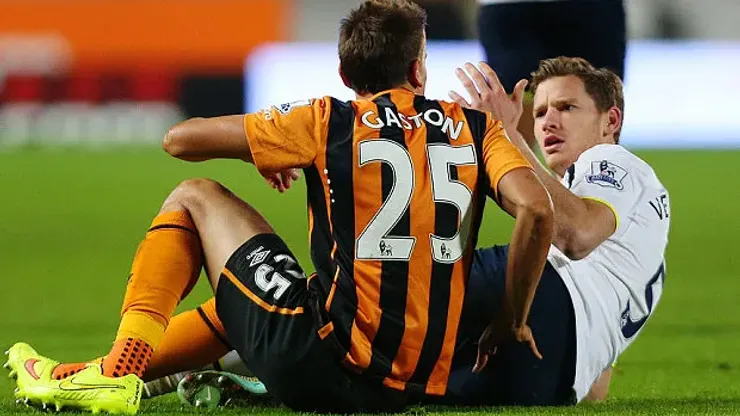There have been a plethora of occurrences in recent weeks when players have reacted in bad to minor provocation. Christian Benteke and Gaston Ramirez were both sent off in games against Tottenham Hotspur for needless, erratic lapses in concentration. Both of their teams were 1-0 up at the time before going on to lose 2-1 to the Londoners after their respective red cards
And yet, while the two aforementioned players in question have done plenty to cost their team a much needed three points, it’s the players on the end of those lapses—Ryan Mason and Jan Vertonghen respectively—that have received the baulk of the criticism for their subsequent reactions. Mason was shoved in the face by Benteke and Vertonghen kicked in the back of the knee by Ramirez.
The over exaggeration of physical contact from footballers can be embarrassing at times and it’s not something that grown men should be indulging in. But the long and short of it is that they do, because the powers that be have facilitated an environment in which it’s almost necessary. It’s why a player like James Tomkins clutched his face on Saturday when shoved in the chest by Kevin Mirallas. It’s why Ross Barkley and Raheem Sterling, two of England’s brightest young talents, took dives in their respective games last weekend.
It’d be admirable for a team and it’s players to take a collective stance on these undesirables, but it’s so commonplace, so engrained in the modern game’s fabric that said team could find themselves at a disadvantage for doing so.
Just look at the incident involving Jack Wilshere and Marouane Fellaini. The incensed England international threw his head towards the rangy Manchester United man right in front of referee Mike Dean, but because the Belgian stood tall, Wilshere was inexplicably let off the hook. If Fellaini had buckled to his knees clutching his face, the Arsenal man would have surely walked.
The Red Devils eventually triumphed 2-1, but United had gone on to lose that game via a key contribution from Wilshere—which they very easily could have done—you suspect Louis van Gaal wouldn’t have been overly pleased with Fellaini behind closed doors. After all, why not accentuate the contact if he’s been head-butted? In the case of Vertonghen, why not go down if someone boots you in the back of the knee?
In a game which is renowned for hinging on minuscule margins, under pressure players and managers need to conjure every edge possible. And at this juncture, this is clearly an area in which some are manufacturing an advantage. It many not be gentlemanly, it may not be in the traditional spirit of the game, but if making the most of an opponents’ erratic temperament helps a team pick up three points, will supporters really care?
It’s an unfortunate state of affairs, but one that has materialized as a result of referees who are under immense pressure and scrutiny. It’s something the canniest players tap into and take advantage of.
Indeed, it’s rare to see somebody sent off unless it’s completely clear cut or, as the incident involving Fellaini astutely displays, unless the player in question goes down. Rolling around on the floor is almost a pre-requisite if a referee is to administer a red card or indeed, a second yellow for a miscellaneous offence.
It’s something former referee Howard Webb touched upon with an interview with BBC Sport back in 2012:
If people cry wolf too often then there is a possibility we will not react as we need to do.
If we come under criticism for stopping the game too many times for doctors or physios to enter the field of play then maybe referees will be inclined not to stop the game.
So just as players have adapted their game to learn to manipulate the unsure officiating, they also must adapt to let incitement pass without getting themselves into mischief. Both Benteke and Ramirez, experienced international players, could have walked away from their respective situations and their team would have most probably won the game.
Ultimately, that’s the bottom line in this issue. Players have been playacting for years now and while pundits and supporters alike are quick to castigate them, next to nothing has been done by football’s governing body to try and rid it from the game. Like it or not, it’s part of the make-up of European football and that doesn’t appear to be changing any time soon.
Hull City boss Steve Bruce bemoaned Vertonghen’s reaction in the aforementioned incident. But you can guarantee the Tigers boss would have happily seen one of his players accentuate a similar contact if it meant his side picked up a critical three points. Until something is put in place by the higher-ups at the FA, for the vast majority the ends will always justify the means.
Follow Matt on Twitter @MattJFootball
200+ Channels With Sports & News
- Starting price: $33/mo. for fubo Latino Package
- Watch Premier League, Women’s World Cup, Euro 2024 & Gold Cup
The New Home of MLS
- Price: $14.99/mo. for MLS Season Pass
- Watch every MLS game including playoffs & Leagues Cup
Many Sports & ESPN Originals
- Price: $10.99/mo. (or get ESPN+, Hulu & Disney+ for $14.99/mo.)
- Features Bundesliga, LaLiga, Championship, & FA Cup
2,000+ soccer games per year
- Price: $5.99/mo
- Features Champions League, Serie A, Europa League & Brasileirāo
175 Premier League Games & PL TV
- Starting price: $5.99/mo. for Peacock Premium
- Watch 175 exclusive EPL games per season







